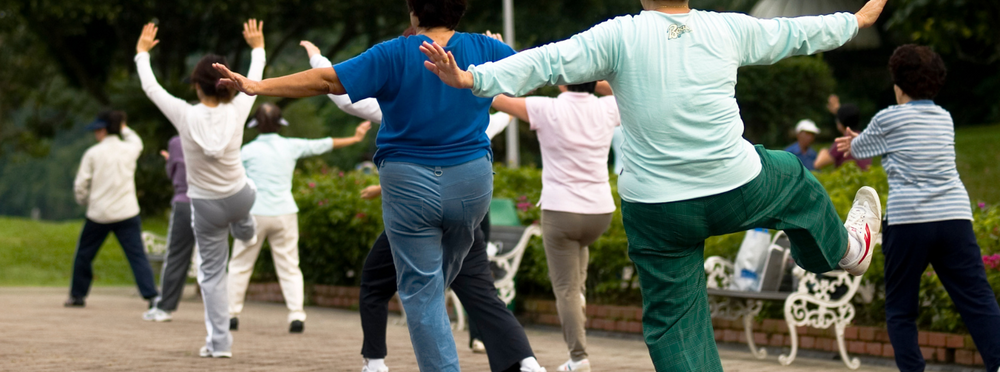Why Balance Might Be More Important for Health Than You Think

When we think about cardiovascular health, we often focus on cholesterol levels, blood pressure, and physical activity. But there’s another, often overlooked factor that may play a much bigger role in our long-term health than we realize: balance.
“Balance” is all about maintaining equilibrium. That can apply to a whole lot of different aspects of health - including nutrition. But today I want to focus on being able to easily attain and maintain a stable position in space so we don’t fall!
The Link Between Balance and Heart Disease
Balance isn’t just about staying upright—it’s about staying independent, active, and safe as we age. And research is beginning to show a strong connection between poor balance and higher risks for serious health conditions, including heart disease, stroke, and even dementia.
A Swedish study followed nearly 5,000 70-year-olds without cardiovascular disease and tested their balance using a balance board. After five years, participants with impaired balance at baseline were significantly more likely to experience a heart attack or stroke.
Similarly, a large-scale study involving over 129,000 adults aged 60 and older found that those with balance impairments had a higher risk of developing coronary heart disease or experiencing a stroke.
Balance and Brain Health
But it’s not just your heart that may be affected. Two studies published in 2024—one in the Journal of Prevention of Alzheimer’s Disease and another in the Journals of Gerontology—linked poor balance with a greater risk of dementia. It’s quite possible that in older adults, balance issues may reflect early changes in the brain that precede noticeable cognitive decline.
Why Balance Matters More as You Age
As we grow older, our muscles naturally weaken, and we become more susceptible to falls. In fact, falling is the leading cause of injury among people 65 and older. Poor balance absolutely contributes to this risk. But here’s the good news: balance is something we can train and improve. The diminished health span that can result from poor balance is one of the big reasons I made taking up yoga as my resolution for 2025!
So here’s a quick update on how I’m doing: Not great. As I’ve stated often - I’m not perfect. All this health building stuff is hard and the truth is I’ve not managed to add yoga to my routine in any meaningful way. And that’s totally on me. But, honestly, writing this blog has lit a bit of fire under me. I’m re-energized to stay true to my goals and try again (and again and again if I need to).
After all, maintaining good balance helps ensure that we can continue to walk, move, and exercise—which in turn supports healthy circulation, strengthens the heart, and preserves brain function. That means balance training isn’t just about fall prevention—it’s a heart-healthy habit, too.
Simple Ways to Improve Balance
Balance training doesn’t require a gym membership or fancy equipment. Here are some effective ways to get started:
-
Toe stands – Stand on your tiptoes to strengthen calf and ankle muscles.
Advanced move: Stand on your tiptoes on one leg only.
- Single-leg stands – Hold onto a counter and balance on one foot.
Advanced move: Stand on one foot without holding on to anything - for an extended period of time.
- Walking backward – Slowly and carefully walk in reverse to challenge stability.
Advanced move: You’re walking backwards! That’s pretty advanced already! But you could always do it faster.
- Yoga and Pilates – Great for enhancing flexibility, core strength, and balance.
Advanced move: Do it! (that was mostly for myself).
Balance Is a Window Into Your Health
While poor balance alone isn’t a diagnosis, it can be an early warning sign that your body may need more support—whether that’s in the form of exercise or dietary change. The takeaway is simple: stay active, stay steady, stay well nourished - and stay proactive about your health.
About Step One Foods
Step One Foods offers convenient, scientifically-formulated foods clinically validated to rapidly reduce cholesterol and improve cardiometabolic health. Real food. Real results. Unapologetically delicious. Learn more at steponefoods.com.

Tested & Proven Results.
- Cardiologist formulated
- Supported by over 500 publications
- Clinically-proven, in a double-blind randomized trial with Mayo Clinic and The University of Manitoba
80% of participants lowered their cholesterol in just 30 days. With just two servings per day, Step One Foods offers a proven-effective way to naturally lower LDL (bad) cholesterol.
Get heart health tips and articles like this, delivered right to your email.
New articles every week.
You may also like...

The Most Misunderstood Heart Number (Plus Your Tune-Up Checklist)

You don’t need to avoid foods with cholesterol…except for these



